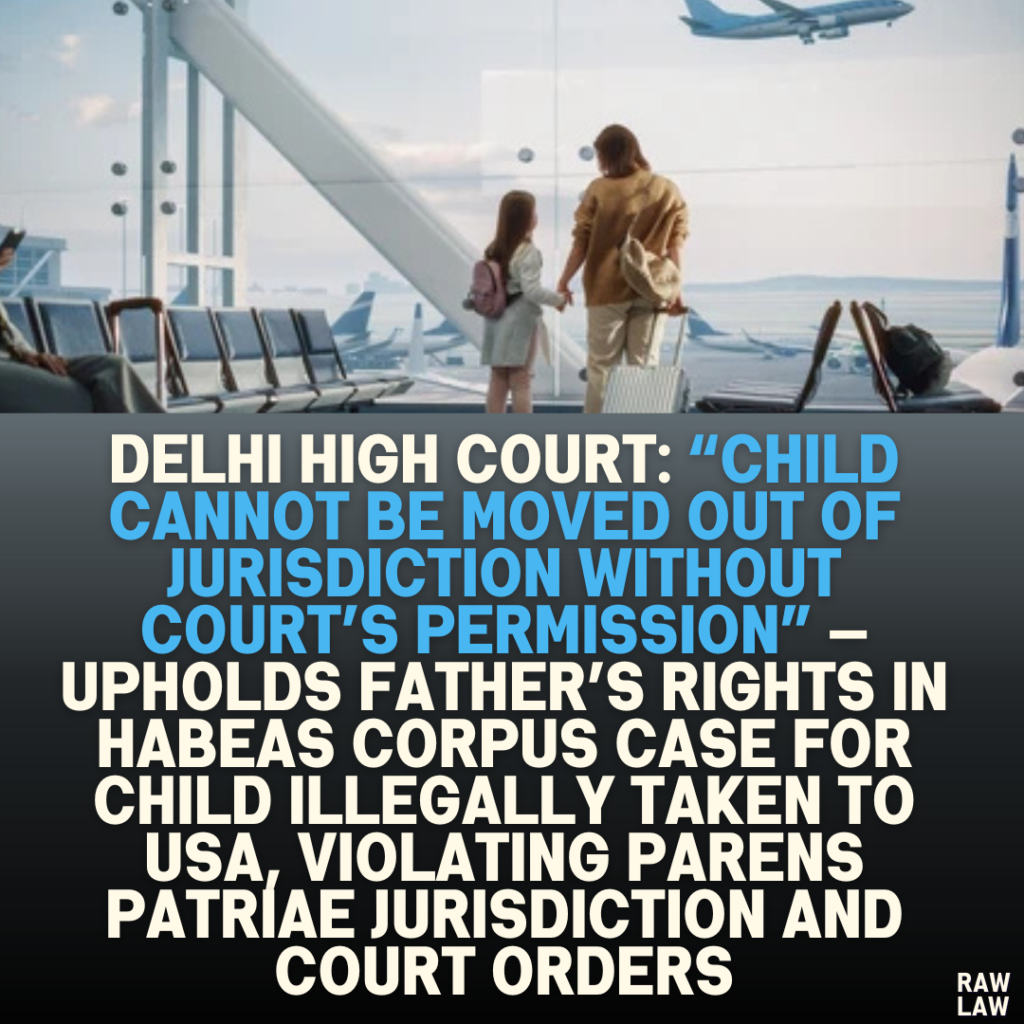Court’s Decision
The Delhi High Court ruled that a habeas corpus petition is maintainable when a minor child is taken abroad without court permission, particularly during pending guardianship proceedings. The Court determined that such action by the mother violated both its prior visitation orders and the principle of parens patriae jurisdiction.
The Court passed interim directions to ensure the father’s visitation rights and emphasized the need to protect the child’s emotional well-being, while restricting the mother and child from leaving India without prior approval.
Facts
- Matrimonial Discord:
- The petitioner-father and respondent-mother were married in 2014 and had a child (born in 2017).
- Due to matrimonial disputes, the mother left the marital home in 2019 with the child.
- Legal Proceedings:
- Multiple cases were filed:
- Divorce petition
- Domestic violence complaint
- Guardianship petition
- Maintenance petition
- Multiple cases were filed:
- Visitation Rights:
- The Family Court granted visitation rights to the father.
- The mother challenged this order before the High Court, where the father was granted unsupervised visitation rights on specific dates.
- Non-Compliance:
- Despite court orders, the mother failed to comply with the visitation arrangement, prompting the father to file a contempt petition.
- Departure to USA:
- Shockingly, on July 26-27, 2024, the mother left for the USA with the child without seeking court permission, in violation of existing orders.
- The father filed a habeas corpus petition alleging illegal custody of the child.
- Passport Issue:
- The father alleged that the child’s passport was issued without his consent despite repeated representations to the authorities.
- The Court directed the Regional Passport Office (RPO) to explain why the passport was issued despite pending legal proceedings.
Issues
- Whether the habeas corpus petition is maintainable when a child is taken abroad in violation of court orders.
- Whether the mother’s act of taking the child to the USA constituted illegal custody.
- What interim measures would ensure the child’s welfare and the father’s access to the child?
Petitioner’s Arguments
- The father contended that:
- The mother illegally removed the child from India without the court’s permission.
- Such action violated existing visitation orders and deprived him of his parental rights.
- The mother was alienating the child psychologically by influencing him against the father.
- Denial of access to the child affects the child’s emotional well-being and violates the fundamental right to love and care from both parents.
Respondent’s Arguments
- The mother argued that:
- She had interim custody granted by the Family Court, which legitimized her taking the child abroad.
- The habeas corpus petition was not maintainable since there was no illegal detention.
Analysis of the Law
The Court examined two key Supreme Court precedents:
- ABC v. State (NCT of Delhi), (2015) 10 SCC 1:
- A pending guardianship petition places the child under the “curial curatorship” of the court.
- The child no longer remains in the exclusive custody of the parents.
- Thus, moving the child abroad without court permission is unlawful.
- Yashita Sahu v. State of Rajasthan, (2020) 3 SCC 67:
- A writ of habeas corpus can be entertained for the best interest of the child, even if the custody is with one parent.
- Violation of court orders related to custody renders such custody questionable and not strictly legal.
The Court applied these principles and held that the mother’s action of taking the child to the USA without permission violated the law.
Court’s Reasoning
- Violation of Court Orders:
- The mother’s departure to the USA violated:
- High Court orders granting visitation rights to the father.
- The principle of parens patriae jurisdiction, as the guardianship case was still pending.
- The mother’s departure to the USA violated:
- Legal Position of Habeas Corpus:
- The Court clarified that habeas corpus is maintainable when the custody of a child is not fully lawful due to violation of judicial orders.
- Child’s Welfare:
- The Court highlighted that prolonged separation from the father had impacted the child’s emotional well-being.
- Ensuring balanced access to both parents is essential for the child’s healthy development.
- Interim Arrangement:
- The Court devised a detailed visitation plan to reconnect the father with the child while ensuring a gradual and positive transition.
Conclusion
The Court passed the following significant directions:
- Interim Visitation:
- The child will spend time with the father twice a month from Friday evening (after school) to Saturday evening (5 PM).
- The father will pick up the child after school and return him to the mother’s residence.
- No Travel Without Permission:
- The mother and child are prohibited from leaving India without the Court’s explicit permission.
- School Continuity:
- The child must continue studying in his current school in India.
- Parental Behavior:
- Both parents must refrain from brainwashing or influencing the child against each other.
- Compliance Monitoring:
- Any violation of these directions will invite strict legal action.
- Future Steps:
- The parties will attempt mediation to resolve their disputes, including exploring the possibility of a mutual divorce.
Implications
This judgment underscores:
- Strict Enforcement of Court Orders:
- Parents cannot unilaterally move children out of the court’s jurisdiction, particularly during pending guardianship proceedings.
- Child Welfare Paramountcy:
- The court’s duty to act as a parens patriae ensures the child’s best interests, emotional well-being, and access to both parents.
- Maintaining Lawful Custody:
- Even a parent with interim custody cannot violate judicial orders under the guise of lawful possession.




Pingback: Kerala High Court Upholds Conditional Attachment of Property in Custodial Torture Case, Balances Plaintiff’s Claim and Secured Creditor’s Rights: "Attachment Does Not Impede Bank’s Recovery Rights" - Raw Law